The Empowering Neurologist – David Perlmutter, MD and Dr. Michael Ruscio, DC
Check out my interview with Dr. David Perlmutter where we discuss how gut health relates to just about everything else in the body, how changes in gut health can manifest as disease, and what we can do to fix the problem — the ultimate goal.
Dr. R’s Fast Facts
Why is gut health so fundamental?
- The intestinal tract is responsible for over 90% of caloric absorption
- The gut is responsible for the largest density of immune cells
- If you are experiencing chronic symptoms – your best bet is to optimize your gut first
Diet
- Diets that are high in prebiotic compounds like FODMAPS could increase inflammation, leaky gut, and histamine
- By going on a Low FODMAP diet you can reduce inflammation, leaky gut, and histamine
What causes low or high acidity?
- Autoimmunity or anemia increases your likelihood of having low stomach acid anywhere from 5%-50%
- If you are older in age – 50s, 60s, 70s there is a higher likelihood of having diminished output of stomach acid (decreases as we age)
- Family history of ulcers – there is an increased chance you may have too much stomach acid
- Certain foods, especially inflammatory foods, can trigger histamine that then stimulates stomach acid so it may seem like you have too much stomach acid but it could just be a simple dietary change that makes the difference
What if you suspect you have an overactive acidity issue?
- First, look at the risk categories above to see if you might fall into any of those
- Second, start with dietary adjustments
- Third, rectify any imbalances in bacterial overgrowth
What if you are diagnosed with SIBO?
- Know that SIBO can be treated, take heart and stay positive.
- Work with a doctor who has experience with SIBO treatment so you are guided with the right steps
- Start with dietary recommendations
- Low FODMAP Diet (low in the prebiotics and fibers that feed bacteria)
- Consider Antibiotic/Antimicrobial therapy
Should you take antibiotics?
- Avoid over-utilization
- Some antibiotics have a local effect in the gut that you can use to help rebalance the microbiota
- You want to support this with diet, probiotics, and lifestyle changes
- The more locally acting antibiotics, have very minimal side effects
Fungal Overgrowth
- Diagnosing fungal overgrowth is difficult
- We do know that the condition exists
- Candida in stool testing is one way to get clues
- There are natural antifungals that can help
- Probiotics exert antibacterial and antifungal effects
- Oregano is both antibacterial and antifungal
Caprylic acid
- Recommend Broad Spectrum antimicrobial that is antibacterial, antifungal, antiprotozoal (advanced bacteria)
What kind of testing do you do to get clues for what might be going on?
- A little testing can help you get the lay of the land but over testing can overcomplicate and introduce too many variables
- SIBO breath test can be helpful to tell you what is going on in the small intestine
- Stool testing can be helpful to learn about what might be going on in the colon
- Antibody profiles via blood or saliva are also helpful
Fecal Microbial Transplant Therapy
- Definitely not a place to start. Consider FMT only after all other therapies have been exhausted.
- Can be life-saving for people with resistant clostridium difficile infections
- Hopefully the next FDA approved application will be for non-responsive inflammatory bowel disease (studies are showing over a 50% response to this therapy)
The protocol in the book is adaptable to people with different levels of issues
- Reset – diet and lifestyle for example try the 2-4 day modified liquid fast
- Support – probiotics and digestive enzymes
- Remove – reduce unwanted gut bacteria with herbal antimicrobials stimulus
- Rebalance – rebalance gut bacteria after herbal antimicrobial treatment
- Reintroduce – reintroduce foods you removed in step 3
- Feed – feed the good bacteria
- Wean – wean yourself off of supplements in your plan
- Maintenance and Fun
- Check in and see how you are feeling, you can always go back through the steps if you start to experience symptoms again.
- Turn your focus to friends, family, and the hobbies you love
- Get help using this information to become healthier.
- Get your personalized plan for optimizing your gut health with my new book.
- Healthcare providers looking to sharpen their clinical skills, check out the Future of Functional Medicine Review Clinical Newsletter.
Why is Gut Health So Fundamental … 00:04:06
Diet … 00:6:33
(click gray Links bar above to expand and see all links/references)
Acidity … 00:09:16
What To Do About SIBO … 00:13:14
Antibiotics … 00:15:13
Fungal Overgrowth … 00:18:15
Caprylic Acid … 00:20:00
Testing … 00:21:20
FMT Therapy … 00:22:50
Great-In-8 … 00:26:14
Episode Wrap-up … 00:34:23
Episode Intro
Dr. David Perlmutter: Hey, everyone. Dr. Perlmutter here. Welcome again to The Empowering Neurologist. Several weeks ago, I had the opportunity to give a keynote lecture at Paleo Fx. This is a group of influential individuals who are involved in looking at the science behind the idea of emulating our ancestral lifestyle choices like diet and physical activity.
And I also sat on a panel which was really quite interesting where we interacted with the audience. And on my left was a Dr. Michael Ruscio. And I was really very, very impressed with his fund of knowledge, his ability to take really kind of difficult information and make it very understandable for the audience. So I invited him to be on The Empowering Neurologist.
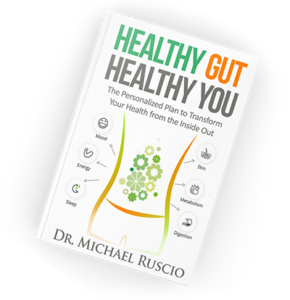
Dr. Ruscio is a researcher. He’s a clinician. He treats patients. He has really good, practical ideas that relate to dealing with chronic illness that have made him a very influential voice in the whole area of alternative medicine/functional medicine. He has published research in peer-reviewed journals. And he does speak quite a bit around the country at various integrative healthcare type of symposia. In fact, he speaks internationally.
The book is terrific! Many have read it. It really has enabled not just patients but doctors as well to understand what can be done to heal the gut and when the gut is healed and made more healthy, how that translates into improving the health for the rest of the body.
So Dr. Ruscio is really leading the charge in terms of getting this information out to the public. And I really look forward to our interview. What I think you’ll find is, again, a terrific ability that he has to take these seemingly very complex issues, not only make them understandable, but more importantly make them actionable. So let’s jump into our interview now.
So Dr. Ruscio, welcome to our program.
Dr. Michael Ruscio: Thanks for having me.
DrDP: I’m very much enjoying your book. And I want to just tell you that when you and I were sitting on a panel recently at Paleo Fx, somebody asked a question. You remember this moment. They said, “What can I do? What’s the most important thing that I could do?”
And you said—and it was very cool that you said it. You said, “You should buy my book and read it.” And I wanted your book at that point. And about two days later, I got one in the mail. I’m very glad that I did.
Your book starts out by talking about how gut health is really so very, very important. And I think we learn that lesson from another doctor, Dr. Hippocrates a while back.
Why is Gut Health So Fundamental
But maybe you could just start off by telling us. Why is gut health so fundamental?
DrMR: Sure. Well, your intestinal tract is responsible for over 90% of caloric absorption. So there goes the ability to absorb this healthy diet that we’re trying to cultivate as part of our lifestyle. And it’s responsible for the largest density of immune cells in the entire body.
And this is a huge connection to make because many of the symptoms and conditions and diseases that we grapple with today have, at least in part, a component of inflammation or altered immune activation or autoimmunity.
And inflammation and autoimmunity are very tightly interlinked. And the analogy I believe I use in the book is inflammation is like a little gun that your immune cells use to attack things in the body that it doesn’t want to have there. So inflammation and the immune response are very intimately interwoven.

But it’s also important not to jump to other treatments if you haven’t gotten your gut in good order first. And when I was a patient about 15 years ago, it’s a mistake that I made. I was pursuing adrenal fatigue and hypothyroidism or what I thought was adrenal fatigue and hypothyroidism, spinning my wheels, while all the while I was missing the underlying cause of my symptoms which was a problem in the gut in my case. So those are a few reasons why it’s so important.
DrDP: You bring up a really good point. And I want to really emphasize that for our viewers. So much of the immune system is really clustered around the gut where it receives programming from the external environment, for example. And I think people think the immune system exists someplace else.
And really, what a great way to start your book, talking about immunity being related to gut health! And so many of our issues today are inflammatory, immunity, and autoimmunity as well. So it’s really about achieving that balance.
Diet
Well, it does obviously then take us to the next point in your book, and that is diet. So diets are popular these days. And one diet versus the next—low carb, gluten free, etc.
DrMR: Right.
DrDP: Let’s just look at the broad strokes in terms of their implications as it relates to the health of the gut.
DrMR: Well, I think one of the main misses that have been occurring in the field thus far has been looking at many of the gut recommendations through a very large-intestinal-focused lens.
And what I think my book brings to the conversation that might be a little bit different is realizing how important the small intestine is. And how this translates into diet is people have likely heard the message, “You need to feed your gut bacteria with fiber and with prebiotics.” And that’s not necessarily true or false. But it depends on the context of the person.
Now, if that person has impairments with their small intestine, they may do very poorly with a dietary approach that feeds gut bacteria with fiber and with prebiotics. And so sometimes we have to revert our dietary recommendations to be more focusing around the small intestine that specifically contains the largest density of immune cells and may be sensitive to bacterial overgrowths.
And so what this looks like is someone may go on a diet that’s high in fruits and vegetables and think, “Yes! This is such a healthy diet.” But they do that, and ironically, paradoxically, they start feeling worse. And it may be because they’re consuming a diet very high in these prebiotics and in these fibers which, for their gut at least in the short term, may actually be problematic.
DrDP: And again, problematic because it does what in the small intestine?
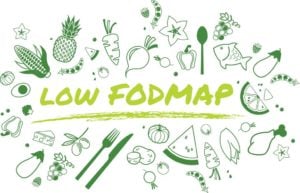
And conversely, by going on a lower FODMAP diet, we can reduce leaky gut. We can reduce inflammation. We can reduce this immune signaling. And we can also see if there is an overgrowth of bacteria in the small intestine known as SIBO which is somewhat common now. We can see all those things rectify by going on a diet that’s still a healthy, whole-food-based diet. But it’s just strategically crafted to avoid a high amount of these foods that are powerful at feeding gut bacteria.
DrDP: Well, you brought up some very interesting points in your book about acidity. Clearly in western society, there’s this war on stomach acid as if it’s been a mistake to put it there in the first place.
DrMR: Right.
Acidity
DrDP: So if you could just walk us through what the landscape looks like in terms of acidity, is it really the culprit that we think it is? Should we be waging war on it? And then I want to get to the point about what people should be doing to determine if, in fact, it is an overactive acidity issue versus other issues that may be confused.
DrMR: Great question. And I outline this in the book where there seems to be these two opposing views. Conventional medicine is very quick to suppress acid. Natural medicine is very quick to recommend supplementing with something like betaine hydrochloride, which is a supplemental form of acid.
And neither camp is completely right or completely wrong. It’s just trying to understand for the individual which direction should they go. Now, we know that about 2-3% of the U.S. population has conditions that are documented to be associated with too much acid. And we also know that if you have autoimmunity that increases your likelihood of having low stomach acid.
So when we look at the data, we see support for some people needing to reduce acid but some people also having a predilection toward needing to increase their stomach acid levels. So it’s a bit of a quagmire.
And also, I should mention that the symptoms of having too much acid and having not enough acid are very similar. So from a symptomatic perspective, it’s also difficult to figure this out. There are tests that are available like the Heidelberg Gastric Acid Analysis. But it’s not a very easily accessible test.
And so a better approach may be to work through this, both looking at a few contextual factors that can help you determine at an increased or decreased probability of having high or low stomach acid and working through that in the context of a greater model like I introduce in the book in terms of a sequence of steps.
Now, if you have an autoimmune condition and/or you have an anemia, that increases the likelihood that you could have low stomach acid to be anywhere from 5 up to 50%. So if you have anemia, especially history of anemia, and/or an autoimmune condition, you’re at greater risk.
Also, if you’re older—and exactly what we define as older is a little bit blurred. But if you’re 50s, 60s, 70s, you have a higher likelihood of having a diminished output of stomach acid because it decreases as we age. And if you’re younger, there’s a lower probability that you have decreased stomach acid.
Now, if you have a history yourself, or even a family history of ulcers, then there’s an increased chance that you may actually have too much stomach acid.
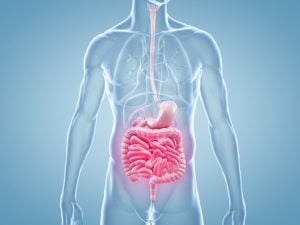
So you can start with diet. And that may resolve some of the symptoms that are attributable to acid, like reflex and stomach burning. And then after diet, you can try to rectify any imbalances and bacterial overgrowth. And there is an association between bacterial overgrowth and conditions of acid perturbations, whether they be reflux or what have you.
So there’s a bit more to it because there’s kind of a lot to tackle in that question. But those are a few broad strokes for people in terms of risk categorization and then also some of the approaches you can take to sort out how to rectify any symptoms of high or low stomach acid.
What To Do About SIBO
DrDP: You touched upon SIBO (small intestinal bacterial overgrowth). It seems to be more and more common. What should a person do if he or she comes back with a positive breath test or is otherwise diagnosed with SIBO? What do they do next?
DrMR: Well, the first thing I would say is take a deep breath because what I’ve noticed from patients coming into the clinic who we then diagnose with SIBO, they have been programmed to think SIBO is far worse than it is from their readings on the internet.
So I would offer the viewer the solace that SIBO is a very manageable condition. It’s not a life sentence. It’s not something that you’re going to be struggling with forever. And it’s very treatable.
It’s also important to make sure that diagnosis is being vectored by a competent clinician because the SIBO gas analyzer does spit out a report saying you’re positive or you’re negative. But that’s not always actually accurate. The more contemporary diagnostic guidelines are a bit more stringent. And so you may actually not have SIBO, even though the piece of paper in front of you says that you do. So always filter this through a competent clinician.
And the protocol that we outline in Healthy Gut, Healthy You works very well for SIBO. We start with dietary recommendations. A very helpful dietary recommendation for SIBO can be a low FODMAP diet. And so we introduce the concept of a low FODMAP diet which is essentially a diet that’s low in these prebiotics and fibers that feed bacteria. And so if someone has a condition of bacterial overgrowth, it would make sense to reduce the food that feeds bacteria. So that’s one thing that can be very helpful.
DrDP: You have eight points at the end of your book which I think really play upon the four R program that was developed in the functional medicine world. And now we have eight points to remember. And we’ll go through them later on.
Antibiotics
But one of them was remove. And in that context, there was a section in the book that actually indicated that there is a time and place for antibiotics in treating certain gut issues in order to remove certain things that are problematic. And a lot of people are so anti-antibiotics so much. They are probiotic. No. They’re against antibiotics.
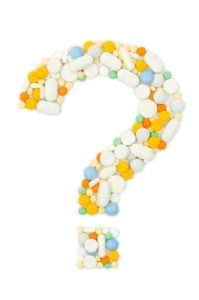
DrMR: I agree. And that, I think, is a well-intentioned ethos that’s forming in the community. But it’s important to avoid over utilization of antibiotics. “I’ve had a runny nose for two weeks. It’s not going away. I’m going to go get a Z-Pack antibiotic.” That type of administration, I think anyone would be in agreement, needs to go away and stop being practiced. But unfortunately, that has permeated the conversation about antibiotics at large.
And there are certainly times when antibiotics or even pharmaceutical anti-fungal agents can be very helpful. If we’re using them in an overall strategic approach to try to rebalance your gut, then they can do volumes.
And certain antibiotics can be used that only have action in the small intestine and don’t become absorbed and have systemic, broad-acting effects. So that can be very helpful to use some of these antibiotics that only have a local effect in the gut.
And if you can use an antibiotic to help rebalance the microbiota and then support that with things like probiotics, lifestyle changes and a healthy diet, you can maintain that equilibrium in the long term. So a two-week antibiotic stimulus could help you rectify the colonization of the bacteria in your gut in the long term. So that’s a very justifiable position, I think.
And also, when you look at many of the studies using some of these antibiotics, yes, some have side effect profiles and are things that you should discuss with your doctor. But some of the more locally acting antibiotics have very, very minimal, if any, side effects reported, even after repeat administration.
So we should be open to the use of an antibiotic, especially if you feel like your provider is conscientious to not over using them.
DrDP: It’s clearly a very, very difficult area to discuss because of the known, long term consequences of antibiotics and, more importantly, the unknown consequences with reference to gut bacterial diversity being compromised, associations of antibiotics with other issues down the line be it diabetes, obesity, perhaps immune disregulation.
But points are certainly well taken. It’s all about being judicious and recognizing that these medications may play a role.
You mentioned fungal overgrowth. And I think that would be a time to consider that there may be a place for either an anti-fungal medication that is systemic or, perhaps more importantly, one like Nystatin that remains within the gut and would then treat fungal overgrowth. Do you see much fungal overgrowth?
Fungal Overgrowth
DrMR: Yes. Now, defining some types of fungal overgrowth is more difficult than others because we do know, as a component or similar occurrence to small intestinal bacterial overgrowth, some researchers are now finding in a clinical research setting small intestinal fungal overgrowth.
But diagnosing that in routine clinical practice is very difficult because you essentially have to do an endoscopy which is the tube down the throat, take a sample of fluid from the small intestine, and then culture that.
So it’s not something that can be done outside of a research setting. But we do know that the condition exists. And we also see some diagnoses of Candida or like fungus on stool testing. So that’s an easier diagnosis to make.
But yes, that’s something that you do see in clinical practice. There are pharmaceutical agents that can be useful. And as I positioned it in the protocol in the book, we know that probiotics exert antibacterial and antifungal effects. So that’s one stimulus that most people feel very safe and comfortable using—probiotics. They do have antibacterial and antifungal effects.
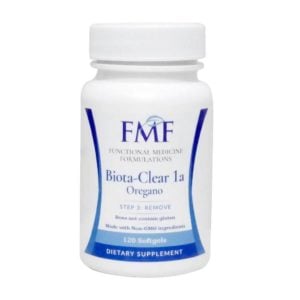
Caprylic Acid
DrDP: One of the most powerful nutritional, supplemental approaches has been the use of caprylic acid which actually has become popular these days because it’s part of MCT supplementation to get people into ketosis. How does that look on your radar in terms of tools for yeast?
DrMR: Yeah, I’m very open to caprylic acid. I use caprylic acid. I typically like to use a formula that’s broad spectrum, that’s antibacterial, antifungal, and also antiprotozoal. And protozoa, you can think of it as, for lack of a better term, kind of advanced bacteria, if you will.
And the beauty of some of these herbal medicines is you can have one compound that in the same formula is antibacterial, antifungal, and antiparasitic or antiprotozoal. And this is something important because it ties into the conversation regarding testing.
There are imbalances that occur in the gut that we’re not able to test easily but we know exist. And this is why I like using the broad spectrum, herbal antimicrobials because let’s say we find small intestinal bacterial overgrowth, but we weren’t able to test for it or to find small intestinal fungal overgrowth. This is where an herbal medicine that acts against both can be helpful. And even if you don’t have the fungal overgrowth, an herb like oregano is not going to do any damage if it’s used in someone who has SIBO plus SIFO or just SIBO alone.
Testing
DrDP: When you test, what are you actually looking at? We can talk about culturing. We can talk about 16S RNA analysis, metabolic products, evidence of inflammation, secretory IgA. What are some of the things that you get back on your patients that clue you in as to what’s going on in the gut?
DrMR: And you use a great term there which is “clues.” And I just want to echo that we get clues. We don’t get a definitive, literal printout of what’s going on in the gut. And sometimes, I think patients look at testing results as being overly literal. They just provide us a clue in terms of the overall milieu of the gut.
But a breath test for small intestinal bacterial overgrowth, I think, can be very helpful. There’s also stool testing that can tell you what’s going on, more so in the colon. But you can get some stomach bacteria in a stool test. But a stool test can tell you about other types of bacterial overgrowth, fungal overgrowth, and inflammatory markers.
And then there are antibody profiles which can be done via blood or via saliva which can tell you if your immune system is reacting against fungus or bacteria.
And there’s a lot more you could do. But I would caution the audience not to go too far down the testing rabbit hole because there’s a very sharp inverted U of benefit and then negative, diminishing returns with testing. A little bit of testing can help you get the lay of the land. But because cautious not to get sucked too far down into the rabbit hole of testing because you very quickly can squander your resources without gaining any additional, constructive clues in terms of how to guide treatment.
FMT Therapy
DrDP: One of the certainly most controversial ideas in terms of repopulating the gut with healthy organisms, if you will, has been the notion of fecal microbial transplant. And in fact, in your book you actually talk about that. What is the response that you get when you bring up this idea to patients?

But it dates all the way back to Chinese medicine where I believe they called it “yellow dragon soup.” Now, they would literally drink a slurry of someone’s stool. We have a little bit nicer methods of application today thankfully.
But for people with resistant Clostridium difficile infections, this can be a lifesaving process or a lifesaving treatment. Now, that probably does not apply or interest most people listening to this.
And I have the strong feeling the next condition that the FDA will approve FMT for is nonresponsive inflammatory bowel disease. We’re seeing more and more studies being published showing around a 50%, even north of that, response rate to fecal transplant. And when we weigh that against using something like Imuran or Humira, which is a strong immunosuppressive drug that does carry side effects, against the FMT, which to date—although we don’t have great long term safety data, at least the short term safety data shows an acceptable safety level with very low adverse events reports—
DrDP: Oh, absolutely.
DrMR: I think that’s definitely something for people to consider. But on the other side of the coin, I wouldn’t start there. Sometimes, people hear about this therapy. And they want to jump right there after they’ve tried one or two dietary changes and one or two probiotics. And that would be putting the proverbial cart way before the horse. And I mentioned that in the book in terms of, “This is something to consider but only after you’ve exhausted all the other therapies that are available.”
DrDP: So we are seeing research geared at the utilization of fecal transplant for autoimmune conditions, even type 2 diabetes. Dr. Max Nieuwdorp in Amsterdam has actually published and presented his research. There’s been a published study on autism. 20 autistic children treated in the University of Arizona with really great response.
So I think there’s an ick factor of transplanting fecal material from one human to the next. But I think it really is looking like there is some value here to considering that.
And I think where we’re moving to is this notion of maybe not necessarily transplanting all the fecal material and the bacteria but some components. And I know that various researchers are looking at those components to determine what, dare I say, is the active ingredient. I always, like you, want to reject that notion of the active ingredient.
Great-in-8
I want to get to the eight interventions or modes that you talked about towards the end of your book, dealing with things like how we reset, how we supplement, how we restore. So let’s start with reset. Where do we begin when we’re trying to reset the gut?
DrMR: Well, the eight-step protocol at the end of the book, entitled the Great-in-8, was meant to give people an adaptable plan so that—let’s saw we had one person who just has some mild bloating and constipation. And we also had another person who had severe Crohn’s disease. They could both utilize this protocol. And they would each be able to go through a plan that was crafted for their level of need. So the person with just a little bit of bloating and constipation may only need to go through two or three of the eight steps, whereas the person with Crohn’s may need to go through all eight.
So it’s adaptable so that it’s efficient so that you can obtain results but also not have to do any more than you need to.
And so to step one—
DrDP: So it’s broad stroke—
DrMR: I’m sorry.
DrDP: But yet it’s very personalized.
DrMR: We check in at the end of every step. And we use someone’s improvement to direct, are they going to go into the maintenance track now, and they’re kind of done? Or are they going to continue escalating therapies and continue working through the protocol? Because not everyone is going to need the same amount of steps.
DrDP: But what do you mean by “reset”? What are you doing to the gut to reset it.
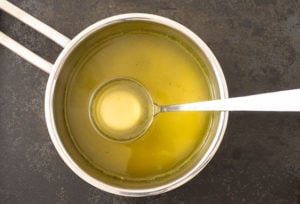
But some people—I would argue most people—may not be able to pull off a strict water fast. They’ll need some type of calories to prevent them from getting tired and hungry or hangry. And this is where using a liquid solution that provides you some calories but is also very gut friendly can be very helpful. And this can be quite a cathartic experience for some people.
Now, they can make either a homemade bone broth or a homemade cleansing lemonade and essentially sip on that throughout the day for anywhere from two to four days. And the analogy I use in the book—if you sprained your ankle and you were running 3 miles every day, it may take quite awhile for that ankle to heal if it ever healed. Now, if you have a gut injury and you’re eating three meals a day, it may take awhile for the gut to heal.
So giving the gut this modified fast can be a step in helping to do a mini reset to get you moving in the right direction. Will it solve all the problems?
DrDP: That’s a very valid analogy. I like that. Next step is support.
DrMR: And so along with step one, we also help people to find their ideal diet. I want to make sure we don’t gloss over that. We already touched on some of those things. But we help people identify what diet will be best for them out of the available diets that are on the market, I guess you could say.
But then step two is support. And one of the main components here is probiotics. And I discuss the three main categories of probiotics. And I think for people this is very helpful because they see hundreds of probiotic products out there. And it’s hard to make heads or tails of what I should use.
If you understand that these products either can be organized in the category one, category two, or category three, you can then simply choose one product from each category, see how you do with it, say yes or no it’s helpful, and then move on.
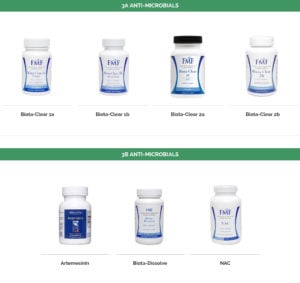
DrMR: So we talked about how probiotics can be antifungal and antibacterial and antiparasitic. But for some people, they’ll need a stronger stimulus to remove any of these overgrowths. And this is where we can then add in either antibiotics—but they’re not the first thing I recommend.
First, I would recommend the herbal antimicrobials which are more directed at helping to clean out bacterial, fungal, or even protozoal/parasitic issues in the gut.
DrDP: Okay, then we go to rebalance.
DrMR: And the rebalance step is meant to be done after this strong antimicrobial stimulus with the antimicrobial herbs. And we essentially use prokinetic therapy which helps to keep things moving through the gut. And the theory here is that if food is not moving through your gut at an adequate pace, if it stagnates, then bacteria and fungus can overgrow.
Just like pond water fosters a lot of overgrowth but running river water tends to be cleaner, same thing in your intestines. So we use a short course of natural agents that help to stimulate motility, although we do provide some pharmaceutical options also if people don’t achieve adequate resolution or response with the natural agents. And that’s important to do after the antimicrobial stimulus to make sure things keep moving and you prevent this overgrowth from recurring.
DrDP: So in terms of natural agents that can enhance motility, what might you choose?
DrMR: Well, there’s one product on the market. It’s becoming increasing difficult to get in the U.S. I believe it’s been taken off the U.S. market. But I think you can still buy it on Amazon for some reason. Amazon seems to be able to do almost anything it wants to.
DrDP: Rules the world.
DrMR: Right, right. And it’s known as Iberogast. And Iberogast can be helpful. There’s another product known as MotilPro. And this contains ginger in addition to a few other compounds.
I should clarify, though, that we don’t have one study to date showing that these agents can prevent the overgrowth of bacteria and fungus. We know that there have been one or two studies on drug therapies of the same mechanism that have shown the benefit. And we know that these natural agents can help with other digestive issues and can help with motility. But there has not been a clinical study done proving their effectiveness. I just want to clarify that.
DrDP: I want to tell our viewers that—we’ve had many guests on the program talk about balancing the gut, removing, restoring. But the notion of motility has been ignored, I think, until you really jumped on it. And I think it’s actually very important.
We also understand that short chain fatty acid production from our microbiota does tend to regulate what we call transit speed (so the degree of motility, how quickly things move through). It’s one of the markers of caloric availability. So when calories are scarce, our motility slows down so we can extract more calories from our food.
So one of the ways that that’s regulated in the body is these products from the bacteria that are made in response to the food that the bacteria is given.
Finally, you end with maintenance and then the word “fun.” So I can’t say that I’ve been thinking everything so far has been a lot of fun. But let’s talk about maintenance and then get to fun after that.

And so I try to bring people back to turning their focus toward friends and fun. And it’s important not to—as one example that I see fairly commonly—keep yourself on this overly restrictive diet forever because that can cause you to withdraw from social activities and not engage in as much fun as you’d like to. “I don’t want to have any wine because I heard wine is bad for your gut. I don’t want to go out to dinner with my friend because I don’t know what’s going to be in the sauce.”
And yes, there are some people, a small percentage, who are very sensitive and have to be that cautious. But for most people, you don’t have to be that careful. And it’s important to keep that in mind so that you can have a little bit of fun.
And I believe it was Nietzsche who said, “He who has a why to live can overcome almost any how.” So it’s important to maintain that, “What am I living for?” so that as you become healthier you’re pulled back into the stuff in your life that you enjoy.
Episode Wrap Up
DrDP: Well, that is a terrific place for us to conclude. And that is bring joy to your life. And it’s very good points about people getting overly dialed in on—we call it orthorexia, the idea that, “Oh, I can’t ever have this or that.” And I think that most people would agree that you do the best you can.
I’m not a big believer in everything in moderation. When people give me that argument, I always say, “You mean like, just a little bit of sniffing glue from time to time should be okay. I don’t believe it.”
But I think the broad strokes are important. But I think tightening down even more these days is, I think, important because we’re being bombarded by so many factors that affect the gut—the medications, the water that we’re drinking, the amount of stress in our lives, sleep, etc. So all good stuff.
Terrific book! I’m glad I got to share some time with you a couple of weeks ago down in Austin. I thought that was a lot of fun. So I’m looking forward to talking with you again soon.
DrMR: Yeah, same here. I always enjoyed being on the panel with you.
DrDP: Okay, talk to you later, Michael.
DrMR: Thanks. You, too.
What do you think? I would like to hear your thoughts or experience with this.
- Get help using this information to become healthier.
- Get your personalized plan for optimizing your gut health with my new book.
- Healthcare providers looking to sharpen their clinical skills, check out the Future of Functional Medicine Review Clinical Newsletter.
Dr. Ruscio is your leading functional and integrative doctor specializing in gut related disorders such as SIBO, leaky gut, Celiac, IBS and in thyroid disorders such as hypothyroid and hyperthyroid. For more information on how to become a patient, please contact our office. Serving the San Francisco bay area and distance patients via phone and Skype.
Discussion
I care about answering your questions and sharing my knowledge with you. Leave a comment or connect with me on social media asking any health question you may have and I just might incorporate it into our next listener questions podcast episode just for you!